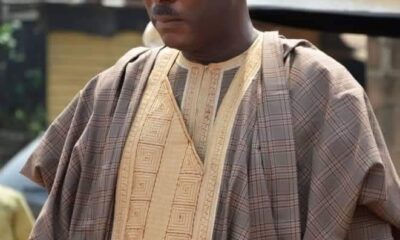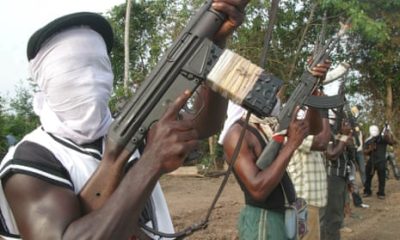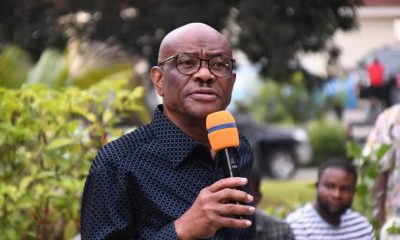Politics
2023: Here Are Five Factors That Helped Atiku Defeat Wike, Others In PDP Presidential Primaries

-
The below are five factors that helped Atiku defeat Wike others in PDP presidential primaries.
THE NATION REPORTERS reports that Nigeria’s former Vice President, Atiku Abubakar, on Sunday emerged as the presidential candidate of the Peoples Democratic Party (PDP).
Atiku defeated 12 other candidates in a keenly contested presidential primary held at the Moshood Abiola Stadium in Abuja.
Of the 764 accredited ballots at the election, Mr Abubakar polled 371 votes while his closest challenger, Governor of Rivers State, Nyesom Wike, came second with 237 votes.
Nigeria’s former Senate President, Bukola Saraki, scored 70 votes to come a distant third while the Governor of Akwa Ibom, Udom Emmanuel, came fourth with 38 votes.
The only female in the race, Oliver Diana, and another contestant, Sam Ohuabunwa, scored one vote each.
A former President of the Senate, Pius Anyim, scored 14 votes while Bauchi State Governor, Bala Mohammed, scored 20 votes.
The other contestants – ex-Governor Ayodele Fayose and Magazine Publisher Dele Momodu – got zero votes.
Twelve invalid votes were recorded.
Atiku had also secured the ticket of the PDP in 2019 but lost at the general elections to the incumbent, President Muhammadu Buhari of the APC.
While Mr Abubakar’s victory at the primary is his second successive attempt, it also marked his fifth shot at the presidency. He has had other unsuccessful contests for the seat under both the All Progressives Congress (APC) and his current party, the PDP.
Here are five things that helped him defeat his closest rival, Wike:
1. Tambuwal’s withdrawal
Before the commencement of the election at the convention venue, one of the top contenders for the race, Aminu Tambuwal, the governor of Sokoto State, withdrew from the race and urged his supporters to vote for Mr Abubakar.
Prior to his withdrawal, Mr Tambuwal was amongst the top three contenders and was believed to enjoy the support of members of the party from the North-west, the region that has the largest number of accredited delegates.
Mr Tambuwal not only withdrew from the race but also asked his supporters to vote for Mr Abubakar. Those votes are believed to have significantly tilted the election in favour of Mr Abubakar.
2. Elders intervention
Mr Tambuwal did not voluntarily withdraw for Mr Abubakar. He was pressured to do so.
The masterstroke which paved way for the former vice president was the intervention of a former president, former military heads of state, former generals, former governors from the north, chieftains of the PDP from the north and a former intelligence chief.
Another section of some PDP power brokers had met with the five northern presidential aspirants to broker a deal for a consensus candidate among them but only Mohammed Hayatu-Deen acceded to their plea for four of them to step down for Mr Abubakar.
Due to immense pressure, Mr Tambuwal agreed to withdraw from the race for Mr Abubakar while Messrs Mohammed and Saraki declined.
3. Political experience
Many believe one of the edges the former vice president had above the Rivers governor and others is his political experience.
Mr Abubakar has been running for Nigeria’s topmost office since 1993, long before Mr Wike ventured into politics, and has been on the presidential ballot since 2007.
Mr Abubakar has thus been able to build a large network of loyalists and supporters across Nigeria unlike Mr Wike, for whom this is the first time he is running for president.
4. More Northern delegates
Another factor that worked in Mr Abubakar’s favour was the difference in the number of delegates between Northern and Southern Nigeria.
Mr Wike and all the governors of the 17 states in Southern Nigeria, had demanded that the presidency returns to the zone after President Muhammadu Buhari’s eight years in office.
Although power shift or rotation is not enshrined in the Nigerian constitution, it is believed by some to be a gentleman’s agreement that power rotates between the North and the South.
Mr Wike is believed to have enjoyed the support of many PDP governors in the south of the country.
However, there were more delegates and fewer aspirants from the North, where Mr Atiku is from, compared to the South.
The PDP accredited 774 delegates from the 36 states of the federation and the Federal Capital Territory (FCT) to vote in the presidential primary.
A majority of the delegates, over 400, were from Northern states.
5. Financial capacity
There have been reports that many of the aspirants paid delegates to secure their votes.
Delegates were allegedly paid between $10,000 and $20,000 each by the top aspirants.
However, amongst the lot, Mr Abubakar is believed to have given the highest amount to delegates.
Source: Premium Times
-

 Breaking News3 years ago
Breaking News3 years agoBREAKING: CBN Redesigns Naira Notes
-

 Breaking News2 years ago
Breaking News2 years agoBREAKING: Tinubu Considers Temporary Subsidy On Petrol
-

 Breaking News2 years ago
Breaking News2 years agoJUST IN: Gbajabiamila Dies In UK
-

 News3 years ago
News3 years agoDrama As Church Gives Certificate Of Virginity To Ladies After Testing Them (See Photos)
-

 Crime4 years ago
Crime4 years agoUproar As Student Teacher On Teaching Practice Impregnates 24 Girls, Headmistress, Four Female Teachers
-

 Breaking News10 months ago
Breaking News10 months agoJUST IN : Sacked Osun LG Chairman Killed Few Minutes After Returning To Office
-

 Breaking News2 years ago
Breaking News2 years agoBREAKING: Dangote Speaks As BUA Reduces Price Of Cement
-

 Crime3 years ago
Crime3 years agoJUST IN: Gunmen Storm Osogbo, Kill Man, Daughter Few Hours After His Wife Put To Bed (Photos)












